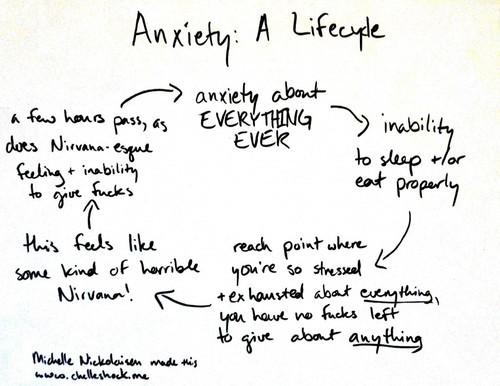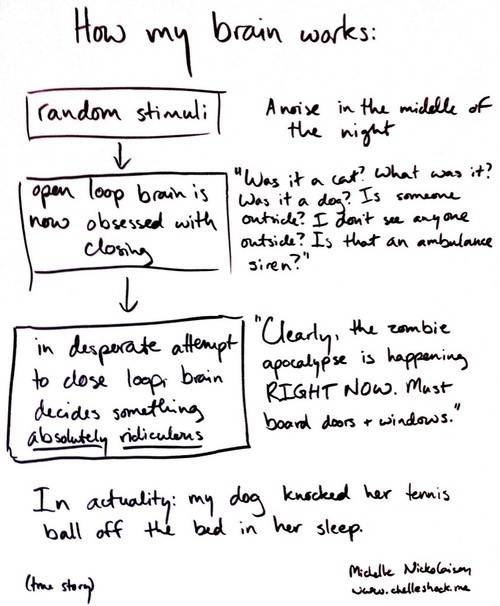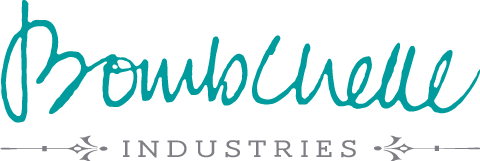
(This was originally published in May 2013, in a slightly edited form at Kelly Diels’s blog as a guest post; I’d like to collect most of my writing into one spot on the internet, so I’m reposting this and some other pieces. It’s also worth noting I’m not on medication any more which is a whole ‘nother story, so some of this no longer applies, but I’m posting it in its mostly original form.)
The thing that astounds me the most out of all of my adventures with the dysfunctional head-mate that is anxiety is how long I was mostly functioning. It only finally got to the point where I was non-functional well after I was out of survival mode. When I was dealing with infidelity, the electricity being shut off, or the dissolution of my marriage, I was freaked the fuck out, but I was functional. I could usually get through the day without breaking down and I could sleep most nights and I could eat.
However, give me six months or so of gradually building tension with a two week tipping point, and I snapped. I was not functional in a pretty distinctive way. I couldn’t eat. I couldn’t sleep. I kept working myself into panic attacks (which totally freaked my dog out, which only upset me more, of course).
At one point, I got to where I was so stressed out about everything while simultaneously being almost deliriously exhausted (because hey, anxiety and lack of sleep and food will do that to you) that I crossed some kind of mystical border and reached a point where I was so stressed out about everything, I didn’t care about anything. For about twelve hours or so. Then I resumed the neurosis. <

Reactions you get when you tell people you have an anxiety problem:
“Oh! Have you tried…”
- meditating?
- yoga?
- getting rid of your TV?
- minimalism?
- veganism?
- Buddha?
- Jesus?
- sparkly freakin’ fairy dust?
What you say to these things: “No, thanks for the idea…” or “Yes, and…” with something of a forced smile. When you already feel shitty about everything else, you really don’t want to get into an argument about how, no, I promise, I’m not just being difficult on purpose, these things are really just. not. enough.
Some of these things can help. But when it’s at it’s worst, when the anxiety isn’t just an annoying mosquito buzzing in your ear so much as a monster actively attempting to devour any shred of sanity you have left (and, let’s face it, mostly succeeding), relying on these solutions alone feels like trying to kill a vampire by staking it with a toothpick.
(Fun fact: that’s an actual nightmare I had once! Yay, stress dreams!)
My personal favorite is “Just stop worrying so much!”
It’s like telling a heroin addict to just stop using. I imagine in both situations the urge to slap the other person & say “If it was that easy, I’d have done it already, asshole” is pretty overwhelming.
I don’t think anyone would be so willfully ignorant of another person’s pain and struggles, so I have to believe the root of it is people just not knowing and honestly trying to be helpful. I’ve spent a lot of time trying to describe it to people. And here’s what I’ve got.
This is what anxiety feels like:
It feels like waking up at four in the morning from a stress dream, in the middle of a panic attack, and not being able to fall back asleep.
It feels like a vice around your stomach that kills your appetite, puts you in a state of perma-nausea, and makes you reject food even when you know you need to eat. (On one of the days that was, honestly, a better than usual day, I remember being so happy that I had managed to eat a breakfast taco without incident, and started on breakfast taco #2, only to be completely unable to finish it. I tried to finish it, because I knew I needed the fuel, and wound up gagging on it. My body straight up said “Nope, we’re not doing that today!”)
It feels like having one of those mythological demons that sits on your chest and steals your breath with you, all the time, not just when you’re sleeping. A constant subtle pressure that you aren’t even necessarily aware of until it’s removed (or until it escalates to the point where your chest is so tight you feel like you can’t breathe).
It feels like listening to the static between radio stations, catching a word here or there, and it’s all whispers of the worst case scenarios for everything ever. And it is always, always, always on in the back of your head.
It means your brain hates open loops.
It will obsess about open loops, any time you encounter one, whether it’s an actual puzzle or a piece of confusing behavior from someone else or just something entirely random, ad nauseum. (Often literally, in this case.) It’ll do this until it comes up with a way to close that loop. Unfortunately for you, that solution is usually, let’s say, less than ideal.

(As you can imagine, this makes certain kinds of social interaction, including dating, less fun and more of an adventure in ways to stress yourself out.)
So many people demonize medication, & there’s a lot of nuance to be had here. Big pharma, ridiculous profit margins, potential side effects, etc. etc. But after experiencing my before & after, I wish I had done it sooner. (I definitely think there’s a larger conversation to be had here about all of this, but I think it can be done without making people who are already at the end of their rope feel shitty and like being on medication is a personal failure and/or act of stupidity.)
I was scared – no, really, terrified – to go on medication, but I knew that the way I was at that moment was not sustainable in any sense of the word and I had no idea what else to try. I was afraid meds would dull my emotions, making it difficult to be genuinely happy or sad or enthusiastic about anything. (I pride myself on my enthusiasm, which is probably a weird thing to be proud of, but whatevs. The thought of losing my ability to be wildly enthusiastic + super excitable was horrifying to me.) I had convinced myself that it would make me bad at my work (obsessive attention to detail & planning for all scenarios are qualities that make for a great project manager, after all).
It reminds me of when I first got glasses at age seven or eight – I hadn’t realized how bad my eyesight was, and then on the drive home from the optometrist, my mom said, “So, what do you think?” I replied excitedly, “Mom! I can see the leaves on the trees! And read the street signs!”
It’s the difference between standing in a crowded room where everyone is shouting and you’re just trying to string a coherent thought together while fighting the urge to cover your ears and scream, and doing that same thinking in a quiet, sunny room. Except, before, you weren’t fully, actually aware of how godawful loud that first room was. And now you’re in awe of just how easy everything is.
No more chest tightness.
No more stress nightmares.
No more endless static.
Best part? I’m still me and I’m just as good, if not better, at what I do. (Shock: it’s much easier to think straight, focus, and be productive when you’re well-rested and not perpetually stressed + on edge to the point of tears.)
Next time someone trusts you enough to share their struggles with you, for the love of all things good and holy, please don’t start in on the “have you tried…” Instead, hug them, ask if you can take anything off their plate, and show them cute videos of kittens. They probably need that a whole lot more than a laundry list of suggestions, anyways.
(originally written and published in May 2013)
